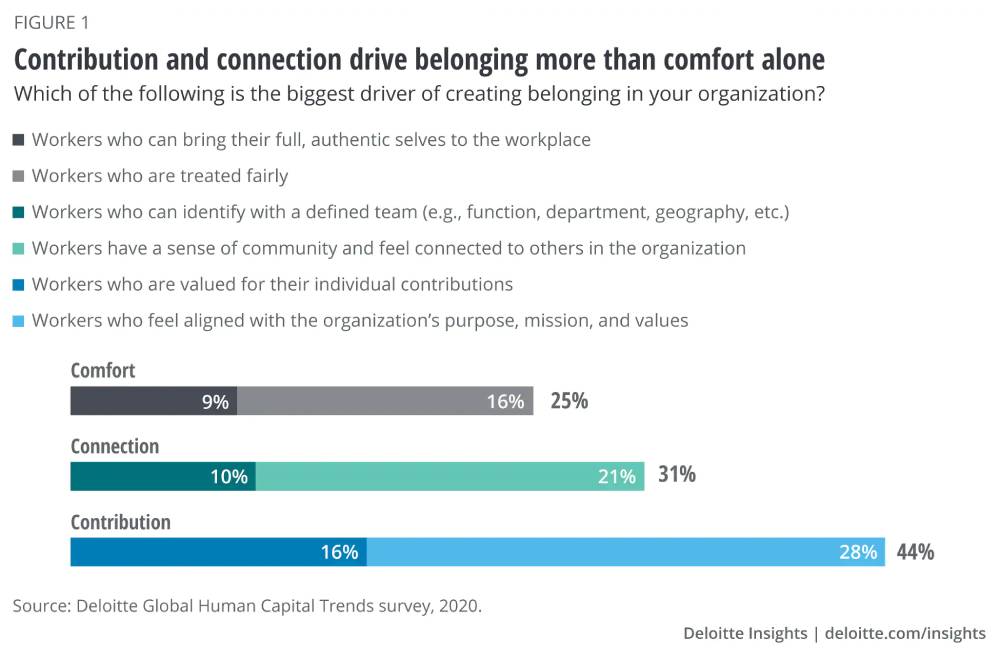Employee engagement is directly impacted by a sense of belonging. This article explains how you can empower your team to feel more purposeful and produce their best work.
We all have a natural desire for social belonging. Despite this, 40% of people say they feel isolated at work.
After the pandemic forced companies worldwide to adopt remote working models, they found an emphasised need for employee engagement. To boost employee engagement levels, creating a sense of connection is essential.
According to Deloitte’s 2020 research, 79% of companies the consulting firm surveyed pointed to a sense of belonging as being essential for their 12-18–month strategy…but only 13% were ready to make changes in this area.
Various factors could come into play here, but one reason could be that they either don’t realise how important staff engagement is or they aren’t sure how to solve the problem.
This article will take a closer look at the impact of belonging on company culture and how technology helps businesses foster a greater sense of employee inclusion.
Belonging and employee engagement
Feeling as though you don’t fit in somewhere is always difficult, whether it’s where you live or where you work. When employees feel disconnected from their jobs and their coworkers, their ability to focus and engage becomes clouded.
Remote working can intensify that sense of disconnection. Besides feeling lonely through no real-life social interaction, a lack of regular communication can make people feel they’re unappreciated or being ignored.

The benefits of creating a sense of belonging for employee engagement are clear. It can improve the employee experience, creating a company culture that sets up employees for success. In addition to improving productivity, it sets the tone for a more collaborative team.
Jay Munro, Head of Career Insights at global job site Indeed, stated: “…those employers who are able to instil a sense of belonging amongst their employees will certainly improve their employer brand and potential for hiring top Australian talent.”
Munro takes it further saying that organisations that create relevant policies based on really listening to their employees should experience higher engagement and productivity—resulting in better business outcomes.
Why belonging is good for business
The importance of employee belonging is amplified when you look at how badly companies that don’t focus on this are impacted.
SEEK Employer research found that employees resign due to a number of factors: work conditions / work environment (41%), organisational changes / restructure (35%) and management / leadership in the business (32%).
In addition to companies retaining employees via adequate compensation, they should also consider flexible working hours and creating an environment of contribution and connection.

Source: Deloitte
When employees don’t feel valued, it’s nearly impossible for companies to retain their top talent. Hiring replacements is both expensive and time-consuming. When businesses continuously need to recruit new employees, their HR teams are put under significant strain. Consequently, they have less time and resources to allocate to improving internal employee engagement.
The financial impact of low employee engagement is well documented. According to Harvard Business Review estimates, a strong sense of inclusion could result in annual cost savings of $52 million.
The same article reports that businesses where employees felt connected halved their turnover rate. For their team members, the benefits of feeling at home somewhere were physical as well as mental. Job performance increased by 56% while there was also a 75% reduction in sick days.
How to create a strong sense of belonging in your workplace
What makes people feel included is different for everyone. However, you can still help to foster this within your employees. The right technologies and tools can help you overcome this epidemic of workplace loneliness.
Create regular surveys
To determine the root causes of isolation in your workplace, first get an accurate idea of what you need to change. Your employees can tell you, so it’s a good idea to look at creating regular surveys.
Surveys are useful for collecting information from your colleagues because they’re anonymous. Therefore, people are more likely to be honest, rather than telling you what you want to hear. Short surveys are likely to garner a larger volume of responses.
To continue improving your employee engagement strategy, consider the advantages of using a survey platform that provides flexibility with powerful features.
Survey software enables businesses to conduct a broad range of research. Opt for tools that let you create polls, integrate with other third-party solutions and set reminders.
Help employees create more meaningful work
One of the biggest reasons employees feel like they don’t belong in the workplace is because they come to believe that their work has little purpose, and a large barrier to creating purposeful work is spending too long on less important tasks.
In a poll by The Independent, employees in the UK felt like they wasted 15 weeks each year on tasks deemed to be “pointless.” Unnecessary meetings, paperwork and tasks that could be automated all fell into this category.
The solution is simple – free up time for your employees to work on more meaningful tasks.
But how do you do this?
Besides investing in automation software, time tracking will also help your employees survey software solution in their days. By understanding how much time is spent on each task, they can then cut out their biggest time-wasters.
Investing in a time-tracking solution is a great way to help your employees free up more time to create purposeful work.
Recognise achievement
A strong sense of purpose often comes from seeing results in what you do. One of the easiest ways to foster a heightened sense of belonging is by acknowledging employees when they go above and beyond.
Celebrating achievements is especially important when your employees are working remotely. Being out of the office can make them feel invisible, but knowing that they’re still making an impact will keep them engaged and inspired to make more of an impact.
To celebrate your team’s achievements, try setting aside a little time each week where everyone talks about what they’ve done and are proud of. If some employees are in the office and others are remote, be sure to dial in remote team members so they can join the celebrations.
In Summary
When searching for a job, employees are now looking beyond the pay cheque. No amount of money can buy a sense of belonging, and not focusing on this will cost you a lot.
Employee belonging and high levels of engagement go hand-in-hand. To help you achieve both, consider adopting a variety of technologies.
By conducting surveys, helping employees better manage their time and recognising their achievements, you will foster a greater sense of purpose. In turn, they will be more productive and less likely to leave for another company.
Now that you know more about the impact of belonging on employee engagement, why not find out what your employees think? Check out our survey software solution.
About the Author
Dean Mathews is the founder and CEO of OnTheClock, a modern time clock app that helps over 10,000 companies all around the world track time. When not perfecting time tracking, Dean enjoys expanding his faith and spending time with family and friends.



